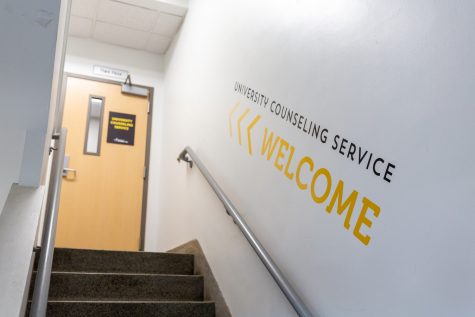Rural hospital benefits from UIHC telemedicine
A telemedicine program allows patients in rural Iowa to receive care from UIHC without traveling to Iowa City. By using an iPad to virtually communicate with providers, this helps reduce hospital transfers while keeping patients close to home.
The University of Iowa Hospitals and Clinics building is seen from the west on Wednesday, Nov. 8, 2017.
October 4, 2018
Following a 16-month pilot program, providers from the University of Iowa Hospitals & Clinics and Van Buren County Hospital have found that using telemedicine improves patient care for residents in rural Iowa.
Data from the program were recently published in the Journal of Hospital Medicine.
Providers from both institutions use electronic communication and medical record databases via iPads, allowing providers at UIHC to remotely treat rural patients. UI Clinical Associate Professor Ethan Kuperman, the principal investigator of the program, said telemedicine allows patients outside Iowa City to have access to providers while decreasing the number of transfers to other hospitals.
“It’s very important to the University of Iowa Hospitals & Clinics that we are a good partner with the rural hospitals that we assist and to have patients in the right location,” Kuperman said. “Most of the patients can stay in their communities, and I think that can be better and safer for them.”
Ray Brownsworth, the CEO of Van Buren County Hospital, said the facility has partnered with UIHC for many years, and both institutions share the same electronic medical record system. The system allows UIHC providers access to treatment plans and to ensure continuity throughout patient care.
“It was a natural fit that we would be a place to partner with as UIHC developed this concept,” Brownsworth said. “The University of Iowa works very well. They are very adaptive and a very good group of people who want what’s best for their patients.”
The use of telemedicine allows a local provider at a hospital to communicate with a UIHC physician on an iPad. Twice a day, both providers speak with the patient together, and they are able to examine lab work, medications, and plans of treatment.
RELATED: Many factors contribute to 20-year ADHD increase, UI researchers say
“One of the early benefits that we saw is that because UIHC is a teaching hospital, the electronic hospitalist is both a provider and a teacher,” said Ronda Fellows, the chief nursing officer at Van Buren County Hospital. “There is a lot of learning going on by getting their input and partnering in care with these providers.”
Fellows said that the program has been well-received at her hospital. Despite having many older patients in the population and being unsure whether those patients would adapt to the technology, they appreciate having a provider in Iowa City watching out for them.
Providers and staff from both hospitals hope to expand the telemedicine technology to more facilities and to increase access to extensive care.
“I anticipate that we will see an expansion of [telemedicine],” Brownsworth said. “There are more opportunities in our primary and specialty clinics. We would be able to access more specialized care that patients couldn’t receive otherwise.”
Kuperman said another goal is to expand to other hospitals throughout the state and to inspire other university programs to function in a similar way.
“There simply aren’t enough solutions to maintain a full-time hospital,” Kuperman said. “If we can empower nurse practitioners and providers, that can inspire the ability to provide care in hospital settings.”




















